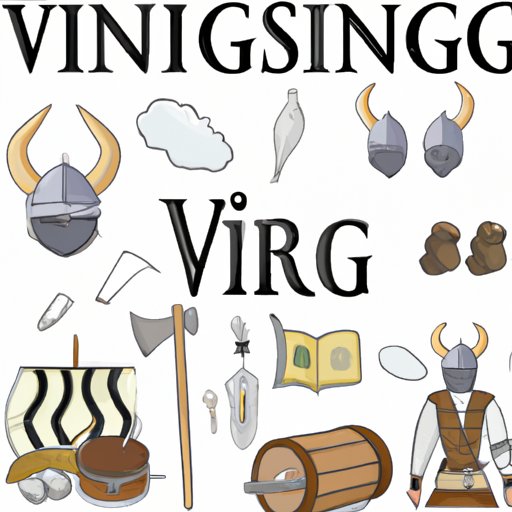Introduction: Why the Vikings are Important
The Vikings are a fascinating and enigmatic civilization that continues to capture the imagination of people around the world. From their fearsome reputation as fierce warriors and raiders to their legendary explorations of new lands, there is no shortage of myths and mysteries surrounding the Vikings. However, beneath the surface, the Vikings were a complex and sophisticated society with a rich cultural heritage that has endured to this day. In this article, we will explore what the Vikings were, where they came from, and why their culture is still worth studying and celebrating today.
Unraveling the Mysteries of the Vikings: A Beginner’s Guide
The Vikings were a seafaring people who originated from the Scandinavian countries of Denmark, Sweden, and Norway. They lived during the period between the 8th and 11th centuries, a time known as the Viking Age. During this time, the Vikings made a name for themselves as skilled sailors, warriors, and traders. They were also known for their unique social structure, which was based on earls, jarls, and kings, and their many achievements, such as their invention of the longship and their advanced navigational skills.
One of the most famous events that is associated with the Vikings is their raid on the monastery at Lindisfarne in 793 AD. This marked the beginning of the Vikings’ reputation as fearsome raiders who would strike at coastal communities throughout Europe. However, the Vikings were not just warriors. They were also skilled traders who established trading networks throughout Europe, Russia, and beyond. One of the most famous Viking explorers was Leif Erikson, who is credited with discovering North America nearly 500 years before Christopher Columbus.
Today, historians and archaeologists use a variety of methods to study the Vikings. They examine historical documents and artifacts, such as runestones and Viking ships, to piece together a picture of Viking society and culture. They also use scientific methods, such as DNA testing and carbon dating, to understand the genetic and environmental factors that shaped Viking life.
The Viking Age: Exploring the Myths and Realities
Despite the many myths and misconceptions about the Vikings, the reality of Viking life was more complex than popular culture often suggests. For example, while the Vikings were known for their raiding and pillaging, they were also skilled farmers who relied on the land for their survival. They also had a complex legal system that relied on a code of honor and strong community relationships.
Another common misconception about the Vikings is that they were a purely homogenous group of people who shared a common culture. In reality, Viking society was diverse and varied, with regional differences in language, customs, and beliefs. However, there were also many shared cultural traditions that were central to Viking identity, such as their emphasis on storytelling and their reverence for the gods and the natural world.
The Vikings were also known for their influence on other societies, particularly in Europe. For example, when the Vikings conquered parts of France in the 9th and 10th centuries, they established a new ruling class that would later become known as the Normans. The Normans later invaded England in 1066, changing the course of English history forever.
Viking Sagas: The Stories Behind the Warriors
One of the most enduring legacies of Viking culture is their rich tradition of storytelling and mythology. Viking sagas are epic tales of warriors, gods, and monsters that reflect Viking values and beliefs. These stories were passed down through generations and were often recited in the form of long poems or songs.
Some of the most famous Viking sagas include the story of Beowulf, a hero who slays the monster Grendel, and the saga of Ragnar Lothbrok, a legendary Viking warrior who was said to have raided and conquered many lands. These sagas are not only entertaining stories but also provide crucial insights into Viking culture and worldview.
Understanding the Viking Mindset: Conquest, Honor & Exploration
To truly understand Viking culture, it is important to examine the values and beliefs that shaped their actions and mindset. For the Vikings, honor was paramount and was often expressed through acts of courage and bravery. They also valued exploration and conquest as a means of expanding their reach and gaining new resources.
However, Viking culture was not just shaped by their inherent values and beliefs. It was also influenced by their environment. The harsh climate and terrain of Scandinavia forced the Vikings to adapt to their surroundings and develop unique strategies for survival. For example, they relied on their longships to navigate the shallow waters and narrow inlets that were common in the Scandinavian fjords.
The Legacy of the Vikings: How Their Culture Continues to Influence Us Today
Despite the fact that Viking society vanished centuries ago, their legacy continues to endure. Viking culture has been passed down through generations and has shaped the identity of many communities around the world, particularly in Scandinavia and the British Isles.
In addition, Viking culture continues to inspire modern artists, writers, and filmmakers. For example, the popular TV show “Vikings” has helped to rekindle interest in Viking history and culture around the world. Moreover, Viking-inspired fashion and home decor have become increasingly popular in recent years, with trends such as minimalism and hygge drawing inspiration from Viking design aesthetics.
Conclusion
While the Vikings may have been a long-lost civilization, their legacy continues to captivate and inspire us today. By examining their achievements, values, and traditions, we can gain a deeper understanding of what it means to be human and how we have evolved as a society over time. Whether you are a history buff, a fantasy fan, or simply curious about the world around you, the Vikings offer a wealth of insights and inspiration that is just waiting to be discovered.
